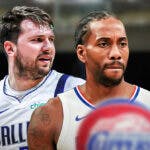After decades of mediocrity, the Los Angeles Clippers are now one of the most respected and well-run organizations in the NBA. With Kawhi Leonard and Paul George entering the fold, they are in a position moving forward to win championships.
Apart from being perennial bottom dwellers in the league, the Clippers also hold the most disgraceful honor of having the worst scandal in NBA history. Most hoops fans probably already know where we're going with this one. That's right, it's none other than the infamous Donald Sterling controversy.
Under Sterling's ownership, the Clippers were a disaster of an organization and a basketball franchise. That's why it's no surprise that majority of Clippers scandals involved their former owner. None of them, however, were bigger than his ill-famed scandal in 2014 when Sterling made racist remarks in a recorded conversation.
On April 25, 2014, as the Clippers fought the Golden State Warriors in a heated first round playoff series, TMZ released an 9-minute audio recording of a conversation between Sterling and his mistress V. Stiviano. Sterling was ranting to Stiviano about a picture from her Instagram account, wherein she posed with Los Angeles Lakers legend Magic Johnson.
In the conversation, Sterling said, “It bothers me a lot that you want to broadcast that you're associating yourself with black people.” The real estate mogul also added, “You can do anything. But don't put him on an Instagram for the world to have to see. And don't bring him to my games.”
This sent shockwaves across the entire NBA given that majority of its players are predominantly black. Players and coaches alike were in uproar over the controversial recording, which also gained national coverage.
The NBA immediately launched an investigation to address the hot-button issue. Meanwhile, the Clippers were preparing for Game 4 against the Warriors, all while dealing with their troubled owner. The entire basketball world wanted the Clippers to take a stand and not play the important playoff game. Instead, they protested by flipping their practice warmers over in an effort to show disassociation with the Clippers franchise.
On April 29, NBA commissioner Adam Silver issued a lifetime ban on Sterling and penalized him with the maximum fine of $2.5 million. Silver banned Sterling from attending any games, going into any NBA arena, practice facilities, or league office, while essentially stripping him from ownership of the team. Many viewed this as one of the boldest moves an NBA commissioner has ever done.
In an effort to salvage his image and express his side, Sterling made his first public appearance in a long time in an interview with CNN. At first, it seemed like the troubled owner was apologetic over his statements. However, he later went on and lambasted Magic Johnson again. This proved to be the final straw.
As much as the NBA wanted to oust Sterling from the Clippers, there were still legal implications to the situation. Sterling still technically owned the team along with his wife Shelley Sterling, who, unlike Donald, was not banned for life. After a lengthy legal process, Shelley was eventually able to sell the team from under Donald's legs to former Microsoft CEO Steve Ballmer.
As dark as those months were for the Clippers, that wasn't the only controversy that Sterling got involved with. In fact, his first one happened at the onset of his ownership of the franchise. In 1982, prior to the NBA draft, Sterling explicitly said that he would welcome tanking if it meant that they would get a franchise player in the draft. The league fined Sterling $10,000, the biggest sum ever at the time, for his statements.
Prior to 1984, the Clippers played in San Diego. After calling San Diego home for six years, Donald Sterling decided to move the team to Los Angeles. However, he made the move with league approval. The NBA fined him $25-million, but Sterling countered with a $100 million lawsuit. Sterling later agreed to drop the suit as the NBA reduced his penalty to $6-million.
Over the course of Sterling's time as Clippers owner, several players shared their own awkward experiences of Sterling's annual “White Parties.” Likewise, others also suggest that Sterling had a “plantation mentality.” Former Clippers general manager Elgin Baylor used this exact term when he filed a lawsuit against Sterling in 2010 for alleged wrongful termination.
The Clippers are certainly happy that Sterling is no longer the owner of the team. As you can see, all of their headaches came from their problematic owner. Now, they can focus on winning their first NBA title with a top-notch organization operating the franchise.




